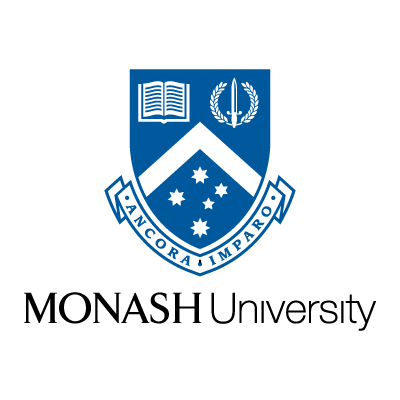Finance
Monash University
About
Few things impact our society more than the exchange of money.
The way we earn, spend, save, borrow and invest it – both as individuals and as a collective – is reflected in everything from interest rates to property prices.With a Bachelor of Finance you’ll build a strong understanding of how our financial system works, and develop the skills you need to manage money well – for big corporations, small businesses and governments.
Structure
The course develops through the four themes of foundation commerce knowledge, specialist discipline knowledge, capstone experience, and elective study.
Part A. Foundation commerce knowledge
These units will provide you with a comprehensive study of economics and econometrics disciplines and the impact they have on multi-discipline decision-making in organisations. The units consider the impact on the business, professional and public policy communities.
Part B. Specialist discipline knowledge
These units will develop your capacity as a critical and creative professional who is able to apply your knowledge of finance to provide discipline based solutions to commerce. Units contained within the discipline may meet the requirements for professional accreditation bodies.
Part C. Capstone experience
The capstone unit is designed to consolidate the knowledge and skills acquired throughout the study of your specialisation.
Part D. Free elective study
This will enable you to further develop your knowledge of finance, or commerce more broadly, or to select any units from across the University in which you are eligible to enrol including to complete a major or minor from another course.
Entry requirements
Qualifications
Equivalent Australian Year 12
Recent secondary education
ATAR requirements
ATAR
86
Note Monash guarantee for 2021 entry ATAR explained Monash is committed to admissions transparencySubject prerequisites
All applicants must satisfy the following prerequisites or their equivalents.
Australian VCE subjects
English
Units 3 & 4: a study score of at least 30 in English (EAL) or 25 in English other than EAL
Maths
Units 3 & 4: a study score of at least 25 in one of Mathematical Methods (any) or Specialist Mathematics
Sciences/Other
N/A
IB subjects
English
At least 4 in English SL or 3 in English HL or 5 in English B SL or 4 in English B HL
Maths
At least 4 in Mathematics SL or 3 in Mathematics HL or 3 in Further Mathematics HL
Sciences/Other
N/A
VET Study
All applicants must satisfy the equivalence of the VCE subject prerequisites.
VET Certificate IV, Diploma or Advanced Diploma graduates: Applicants will require a minimum 70% average to be considered for selection. Preference will be given to applicants whose prior studies are related to the course. Programs that involve competency-based assessment without grades or marks will not be sufficient to meet admission requirements.
Entire academic recordThis course uses the entire academic record as part of its selection considerations.
Higher education
University: Applicants will require a minimum 70% average to be considered for selection. Preference will be given to applicants whose prior studies are related to the course. A minimum of two single units must be completed in order to meet minimum admission requirements.
All applicants must satisfy the equivalence of the VCE subject prerequisites.
Entire academic recordThis course uses the entire academic record as part of its selection considerations.
Work and life experience
Multiple pathways to this course
Applicants who have successfully completed Year 12 are eligible to apply for this course.
Applicants with no formal secondary or tertiary qualifications are not eligible to apply for this course. This course uses the entire academic record as part of its selection considerations.
There are many ways to gain entry to a course at Monash. If you don't meet our entry requirements, there are pathways to help. More about alternative pathways...
Additionally, we recognise that some applicants may have experienced difficulties that have disadvantaged them when applying for university. We offer a range of special admissions schemes that may help you gain entry to your chosen course, including pathways for Australian Aboriginal and/or Torres Strait Islander students. .More about special admissions schemes...
All applicants must satisfy the equivalence of the VCE subject prerequisites
Alternative qualifications and prerequisites
For other domestic and international qualification entry requirements and scores for this course use the study credit and admissions eligibility search.
English requirements
Applicants must also meet the English language requirements.
University entrance requirements
Minimum entrance requirements for admission to Monash University Australia.
Learning outcomes
Learning outcomes
These course outcomes are aligned with the Australian Qualifications Framework level 7 and Monash Graduate Attributes.Upon successful completion of this course it is expected that you will be able to:
1.be critical and creative scholars who produce:
- innovative solutions to problems
- apply research skills to business challenges
- communicate effectively and perceptively
be responsible and effective global citizens who:
- engage in an internationalised world
- exhibit cross-cultural competence
- demonstrate ethical values
demonstrate broad knowledge and technical skills in the area of their specialisation and be able to provide discipline based solutions relevant to the business, professional and public policy communities that we serve
4.be able to analyse and interpret financial data, demonstrate the use of fundamental financial models and empirical techniques and formulate and present investment and financing decisions and justifications thereof, to comply with the Australian Business Dean's Council endorsed Finance Learning Standards of knowledge, application, judgment, communication and teamwork and reflection
5.construct conceptual frameworks and use these to analyse complex issues in the corporate sector, government and the professions.
Institution
